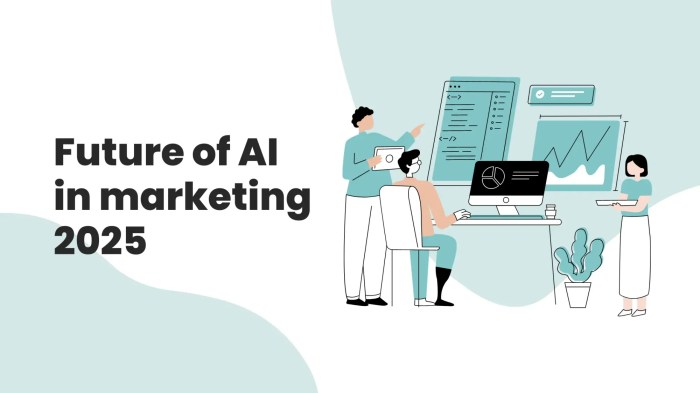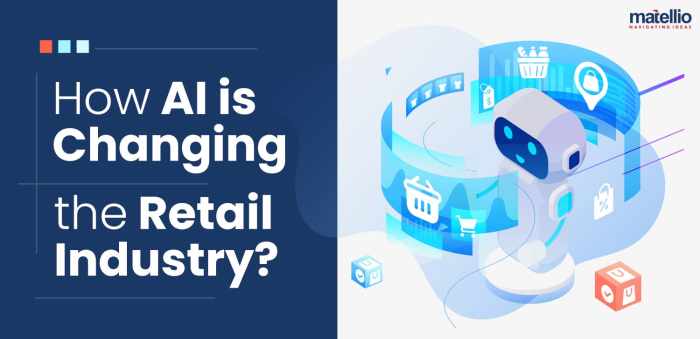Exploring the landscape of retail marketing in 2025 unveils a significant shift propelled by AI technology. From personalized customer experiences to predictive analytics and automation, the impact of AI is reshaping the way businesses engage with consumers. Let's delve into the exciting evolution of retail marketing with AI at its core.
Overview of AI in Retail Marketing

AI has revolutionized the way retailers approach marketing strategies, offering unprecedented insights and capabilities that were previously out of reach. By leveraging AI technologies, retailers can now personalize marketing campaigns, optimize pricing strategies, enhance customer experiences, and streamline operations with remarkable efficiency.
Role of AI in Transforming Retail Marketing Strategies
AI plays a crucial role in transforming retail marketing strategies by enabling retailers to analyze vast amounts of data, predict consumer behavior, and deliver personalized experiences at scale. Through machine learning algorithms and predictive analytics, AI helps retailers understand customer preferences, anticipate trends, and tailor marketing messages to individual shoppers.
- Dynamic Pricing: AI algorithms can analyze competitor pricing, demand fluctuations, and other variables to adjust prices in real-time, maximizing revenue and profit margins.
- Recommendation Engines: AI-powered recommendation engines use customer data to suggest products or services that align with individual preferences, increasing cross-selling and upselling opportunities.
- Inventory Management: AI can forecast demand, optimize inventory levels, and reduce stockouts by predicting which products are likely to sell well in specific locations and timeframes.
Benefits of Integrating AI into Retail Marketing Practices
Integrating AI into retail marketing practices offers a wide range of benefits, from improving operational efficiency to enhancing customer engagement and loyalty. By harnessing the power of AI, retailers can drive revenue growth, increase profitability, and gain a competitive edge in a rapidly evolving marketplace.
- Enhanced Personalization: AI enables retailers to deliver personalized recommendations, offers, and content based on individual preferences and behavior, leading to higher conversion rates and customer satisfaction.
- Improved Customer Insights: AI analytics provide retailers with valuable insights into customer behavior, preferences, and trends, allowing for more targeted marketing campaigns and product strategies.
- Optimized Marketing ROI: By automating repetitive tasks, optimizing ad spend, and targeting the right audience segments, AI helps retailers maximize the return on investment in their marketing efforts.
Personalized Customer Experiences

In the world of retail marketing, personalized customer experiences play a crucial role in attracting and retaining customers. With the advancement of AI technology, retailers can now leverage algorithms to tailor marketing messages and interactions to meet the unique preferences and needs of each individual customer.
AI Algorithms Personalizing Customer Experiences
AI algorithms analyze vast amounts of customer data, including purchase history, browsing behavior, demographics, and interactions with the brand. By processing this data, AI can create detailed customer profiles and predict future behavior. This allows retailers to recommend products, send targeted promotions, and personalize the overall shopping experience for each customer.
- AI can segment customers based on their preferences and behavior, allowing retailers to send personalized recommendations and offers.
- By utilizing machine learning algorithms, AI can continuously learn and adapt to customer preferences, ensuring that the personalized experiences evolve over time.
- Personalized customer experiences lead to higher customer satisfaction, increased loyalty, and ultimately, higher conversion rates for retailers.
Comparison with Traditional Marketing Approaches
Traditional marketing approaches often rely on broad demographic data and generalizations to target customer segments. In contrast, AI-driven personalized marketing enables retailers to connect with customers on a more personal level, addressing their specific needs and preferences.
- AI-driven personalized marketing is more precise and targeted, resulting in higher engagement and conversion rates compared to traditional marketing strategies.
- Personalized customer experiences foster a stronger emotional connection between the customer and the brand, leading to increased brand loyalty and advocacy.
- AI allows retailers to deliver the right message to the right customer at the right time, maximizing the effectiveness of marketing campaigns.
AI Analyzing Customer Data for Tailored Messages
AI algorithms analyze various data points, such as past purchases, browsing history, social media interactions, and even external factors like weather or location, to create personalized marketing messages for customers. By leveraging this data, retailers can deliver relevant and timely communications that resonate with individual customers.
- AI can predict customer preferences and behaviors, allowing retailers to tailor product recommendations and promotions accordingly.
- By analyzing real-time data, AI can adjust marketing messages on-the-fly to optimize customer engagement and conversion rates.
- Personalized marketing messages based on AI analysis result in higher response rates and customer satisfaction, driving overall business growth for retailers.
Predictive Analytics in Retail
Predictive analytics in retail marketing involves using AI to analyze historical data and identify patterns to predict future outcomes, trends, and customer behavior
Utilization of AI for Predictive Analytics
Predictive analytics in retail relies on AI algorithms to process vast amounts of data, including customer demographics, purchasing history, online behavior, and interactions with the brand. By leveraging machine learning and data modeling techniques, AI can generate accurate predictions about future consumer behavior and market trends.
- AI-powered predictive analytics can help retailers forecast sales trends, inventory demand, and customer lifetime value.
- By analyzing data in real-time, AI algorithms can identify patterns and correlations that humans may overlook, leading to more informed decision-making.
- AI can segment customers based on their preferences and behaviors, allowing retailers to deliver personalized marketing messages and offers.
Examples of Predictive Analytics Improving Marketing Campaigns
Predictive analytics has revolutionized marketing campaigns by enabling retailers to tailor their strategies to meet specific customer needs and preferences. Here are some examples of how predictive analytics has improved marketing efforts:
- Targeted Promotions: AI algorithms can predict which customers are most likely to respond to a particular promotion, allowing retailers to target their marketing efforts more effectively.
- Dynamic Pricing: Retailers can use predictive analytics to adjust prices based on demand, competitor pricing, and customer behavior, maximizing revenue and profitability.
- Personalized Recommendations: By analyzing customer data, AI can recommend products or services that align with individual preferences, increasing customer satisfaction and loyalty.
Impact of Predictive Analytics on Customer Engagement and Sales
The integration of predictive analytics in retail marketing has a significant impact on customer engagement and sales performance. Here are some key benefits:
- Enhanced Customer Experience: By personalizing interactions and offers, retailers can create a more tailored and engaging shopping experience for customers, leading to increased loyalty and satisfaction.
- Improved Sales Forecasts: Predictive analytics helps retailers forecast demand more accurately, optimize inventory levels, and reduce stockouts or overstock situations, leading to improved sales performance.
- Increased Revenue: By targeting the right customers with the right products at the right time, retailers can increase conversion rates, average order value, and overall revenue.
Automation in Retail Marketing
Automation in retail marketing refers to the use of artificial intelligence (AI) to streamline and optimize various marketing tasks within the retail sector. By leveraging AI technology, retailers can automate repetitive and time-consuming processes, allowing them to focus on more strategic initiatives to drive business growth.
Role of AI in Automating Marketing Tasks
AI plays a crucial role in automating marketing tasks such as customer segmentation, email marketing, social media advertising, and personalized recommendations. Through machine learning algorithms, AI can analyze large volumes of data to identify patterns and trends, enabling retailers to deliver targeted marketing campaigns to the right audience at the right time.
- Customer Segmentation: AI helps retailers segment their customer base based on demographics, behavior, and preferences, allowing for personalized marketing strategies.
- Email Marketing: AI can automate the process of sending personalized emails to customers, increasing engagement and conversion rates.
- Social Media Advertising: AI algorithms optimize social media advertising campaigns by targeting specific audience segments and adjusting ad placements in real-time for maximum impact.
- Personalized Recommendations: AI-powered recommendation engines analyze customer data to suggest personalized products or services, enhancing the shopping experience and driving sales.
Comparison of Manual vs. AI-Driven Automation
Manual marketing processes in retail require significant human effort and time to execute tasks such as data analysis, campaign optimization, and customer segmentation. On the other hand, AI-driven automation accelerates these processes by handling repetitive tasks with precision and efficiency, freeing up human resources to focus on strategic decision-making and creativity.
- Efficiency Gains: AI automation enables retailers to perform marketing tasks at scale and in real-time, resulting in faster campaign execution and improved response rates.
- Cost Savings: By automating marketing processes, retailers can reduce labor costs, minimize errors, and optimize budget allocation for better ROI, leading to significant cost savings in the long run.
Wrap-Up
As we conclude our journey into the future of retail marketing with AI, it's evident that the landscape is evolving rapidly. The fusion of AI technology and marketing strategies is paving the way for a more personalized, efficient, and data-driven approach to customer engagement.
Embracing these changes will be crucial for businesses aiming to stay ahead in the competitive retail industry of 2025.
Question Bank
How can AI enhance customer engagement in retail marketing?
AI can analyze vast amounts of customer data to tailor marketing messages, creating personalized experiences that resonate with individual preferences.
What benefits can businesses expect from integrating AI into retail marketing?
Businesses can enjoy increased efficiency, cost savings, and improved customer satisfaction by leveraging AI for automation, predictive analytics, and personalized marketing.
How does AI-driven automation differ from manual marketing processes in the retail sector?
AI-driven automation streamlines repetitive tasks, allowing for quicker decision-making and more targeted marketing campaigns compared to manual processes.








![5 Best eCommerce Marketing Digital Agencies [2024 Edition]](https://share.radartasik.id/wp-content/uploads/2025/08/Best-E-Commerce-Marketing-Agencies-2048x1024-1-120x86.jpg)
